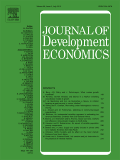
JOURNAL OF DEVELOPMENT ECONOMICS
Scope & Guideline
Elevating discourse on global economic development.
Introduction
Aims and Scopes
- Empirical Research on Development Issues:
The journal publishes studies that provide empirical evidence on various development issues, including poverty alleviation, education, health, and labor markets. This focus allows for a better understanding of the complexities and challenges faced by developing economies. - Interdisciplinary Approaches:
Research often employs interdisciplinary methods, integrating insights from economics, sociology, political science, and public health to address development challenges. This broad approach enriches the analysis and provides holistic solutions. - Experimental and Quasi-Experimental Methods:
The journal frequently features papers that utilize experimental designs, including randomized controlled trials (RCTs), to evaluate the impact of interventions. This methodological rigor enhances the credibility of findings and supports evidence-based policy. - Focus on Policy Implications:
A key aim is to inform policy by providing actionable insights derived from research. The journal encourages studies that assess the effectiveness of development programs and policies, making it a valuable resource for policymakers. - Global and Local Perspectives:
While the journal covers global development issues, it emphasizes local contexts and case studies. This dual focus ensures that the findings are relevant to specific settings while contributing to the broader discourse on development.
Trending and Emerging
- Impact of Digital Technology on Development:
There is a growing focus on how digital technologies, including mobile applications and online platforms, are transforming economic opportunities and social interactions in developing countries. Research in this area explores the implications for education, health, and entrepreneurship. - Climate Change and Environmental Economics:
As climate change becomes an increasingly urgent issue, studies examining its impact on economic development, agricultural practices, and resource management are on the rise. This theme addresses the intersection of environmental sustainability and economic growth. - Gender and Development:
Research exploring the role of gender in economic development is gaining prominence. Topics include women's empowerment, gender-based violence, and the impact of gender-sensitive policies on economic outcomes. - Migration and Refugee Economics:
The economic implications of migration and refugee movements are becoming a central theme. Studies are focusing on how these dynamics affect labor markets, social cohesion, and economic development in host countries. - Behavioral Economics in Development Policy:
There is an increasing interest in applying behavioral economics to understand decision-making processes in development contexts. This emerging scope looks at how psychological factors influence economic behavior and policy effectiveness.
Declining or Waning
- Traditional Economic Growth Models:
There is a noticeable decline in papers focusing solely on traditional economic growth models without considering the broader socio-economic context. The journal is shifting towards more nuanced approaches that incorporate inequality and sustainability. - Sector-Specific Analyses:
Research centered on specific sectors, such as agriculture or manufacturing, without interdisciplinary integration is becoming less common. The focus is now on cross-sectoral analyses that consider the interconnectedness of various economic activities. - Theoretical Frameworks without Empirical Validation:
Papers that rely heavily on theoretical models without substantial empirical backing are less frequently published. The journal's recent trend favors studies that provide empirical evidence to support theoretical claims. - Narrow Focus on Macro-Economic Indicators:
Research primarily focused on macroeconomic indicators, such as GDP growth, is waning. The journal is increasingly prioritizing studies that explore micro-level dynamics and their implications for broader economic outcomes. - Overemphasis on Quantitative Analysis:
While quantitative methods remain important, there is a decline in the publication of studies that do not incorporate qualitative insights. The journal is moving towards a more balanced approach that combines both quantitative and qualitative methodologies.
Similar Journals

Prague Economic Papers
Advancing Economic Thought from the Heart of EuropePrague Economic Papers is an esteemed scholarly journal dedicated to the fields of Economics, Finance, and Econometrics, published by UNIV ECONOMICS-PRAGUE. With its ISSN 1210-0455 and E-ISSN 2336-730X, this journal serves as a vital platform for innovative economic research and theoretical advancement. Operating from the scenic backdrop of the Czech Republic, Prague Economic Papers is recognized in Scopus with rankings that place it in quartile Q4 for Economics and Econometrics, as well as Q3 for Finance, reflecting its growing impact in the academic sphere. Though the journal does not currently offer open access, it ambitiously covers a wide expanse of economic theories and empirical studies, contributing significantly to the evolution of economic thought from 2008 to 2024. Researchers, professionals, and students alike will find this journal essential for accessing critical insights and methodologies that shape contemporary economic discourse.
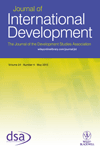
Journal of International Development
Exploring Global Solutions for Sustainable DevelopmentThe Journal of International Development, published by WILEY, is a leading academic journal that focuses on the multifaceted aspects of international development, encompassing both geographic and social science perspectives. With a robust history dating back to 1989, the journal has established itself as a vital resource for researchers, practitioners, and policy-makers aiming to understand and influence development processes worldwide. Featuring a strong impact factor and holding a Q2 category ranking in both Development and Geography, Planning and Development for 2023, this journal is crucial for disseminating impactful research that addresses pressing global issues. While the journal does not currently offer open access, it remains a cornerstone in the fields of development studies, providing in-depth analyses and fostering academic discourse. Set against the backdrop of the United Kingdom, the Journal of International Development continues to be an essential platform for innovation and collaboration in the quest for sustainable development solutions.
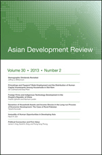
Asian Development Review
Navigating Socio-Economic Landscapes with Rigorous ResearchThe Asian Development Review, published by World Scientific Publishing Co Pte Ltd, is a distinguished journal that has been at the forefront of scholarly discourse in the fields of development, economics, and geography since its inception in 1987. With an Open Access model adopted in 2013, this journal strives to enhance the accessibility of high-quality research, facilitating a broader dissemination of vital knowledge and insights that address pressing socio-economic challenges across the Asian landscape. The journal is classified in the Q2 Quartile category for 2023 in Development, Economics and Econometrics, as well as Geography, Planning, and Development, reflecting its substantial contribution to these fields. The journal also holds respectable rankings in Scopus, placing it in the top 45-55th percentile across various disciplines. Researchers, professionals, and students are encouraged to explore the wealth of research and methodologies presented in this impactful publication, which not only seeks to illuminate current issues but also aims to inform policy and practice across the Asian region.

Indian Journal of Economics and Development
Advancing Economic Insights for Sustainable DevelopmentIndian Journal of Economics and Development, published by SOC ECONOMICS & DEVELOPMENT, stands as a noteworthy platform for scholarly discourse in the fields of economics, business management, and development studies. With an ISSN of 2277-5412 and an E-ISSN of 2322-0430, this journal, based in Ludhiana, India, has been dedicated to advancing research and dialogue since its inception in 2019 and is poised for convergence until 2024. Although currently ranked in the Q4 categories across various disciplines in Business, Management and Accounting, Economics and Econometrics, and Geography, Planning and Development, the journal’s commitment to fostering impactful research is evident in its wide-ranging aims and scope, which seek to explore contemporary economic challenges and developmental issues. While the journal operates without an open-access model, it provides a valuable resource for academics and professionals, and encourages contributions that address both theoretical and empirical questions. Researchers, students, and professionals will find this journal critical as it serves a vital role in the dialogue surrounding economic and developmental dynamics, particularly in an increasingly complex global landscape.
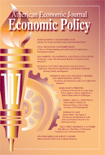
American Economic Journal-Economic Policy
Shaping the Future of Economic GovernanceAmerican Economic Journal - Economic Policy, published by the American Economic Association, stands at the forefront of economic research, focusing on significant policy implications and evidence-based evaluations. With an ISSN of 1945-7731 and an E-ISSN of 1945-774X, this esteemed journal has maintained its influence and credibility in the field since its inception in 2009. Ranked in the Q1 category for Economics, Econometrics and Finance and ranking #7 out of 288 in Scopus, it boasts a remarkable 97th percentile ranking, making it a premier source for cutting-edge research and policy discussion. The journal's rigorous peer-reviewed articles aim to bridge the gap between academic research and real-world economic policy, serving as an essential resource for researchers, professionals, and students who seek to engage with and contribute to the evolving landscape of economic policy. With open access options not currently available, readers are encouraged to subscribe or access articles through academic institutions for comprehensive insights into the economic challenges and innovations shaping our world.
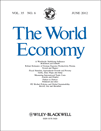
WORLD ECONOMY
Empowering scholars and practitioners with impactful research.WORLD ECONOMY is a premier academic journal published by Wiley, renowned for its rigorous peer-reviewed research in the fields of economics, finance, accounting, and political science. Established in 1977, the journal has consistently contributed to the advancement of knowledge, reflected in its strong standing across various category quartiles, notably achieving Q1 in Accounting and Political Science, and ranking in the top quartile in its respective disciplines as of 2023. With an audience that spans researchers, professionals, and students, WORLD ECONOMY publishes impactful articles that explore critical issues affecting the global economy. Although it is not an open-access publication, readers have access options to engage with cutting-edge research that addresses both theoretical and practical aspects of world economic trends. The journal's commitment to excellence is further underscored by its impressive Scopus rankings, situating it among the top journals in the social sciences arena. For anyone keen on deepening their understanding of the dynamics shaping our economic landscape, WORLD ECONOMY remains an indispensable resource.

Cuadernos de Economia
Advancing economic discourse across disciplines.Cuadernos de Economia, published by UNIV NAC COLOMBIA, FAC CIENCIAS ECONOMICAS, CUADERNOS ECONOMIA, stands as an open access journal dedicated to advancing the discourse in the fields of Economics, Arts and Humanities, and Social Sciences. With its ISSN 0121-4772 and E-ISSN 2248-4337, this journal has been openly accessible since 2001, facilitating the dissemination of research from diverse socioeconomic contexts, particularly in Latin America. The journal is recognized in various Scopus ranks, with notable inclusions within Q3 and Q4 quartiles for 2023, reflecting its commitment to quality scholarly publishing. Operating out of Bogotá, Colombia, Cuadernos de Economia serves as a vital resource for researchers, professionals, and students seeking to explore innovative economic solutions and multifaceted social dynamics. Through its publication, the journal aims to foster academic exchange and support the development of new ideas in the ever-evolving landscape of economics and society.
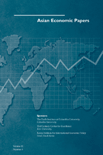
Asian Economic Papers
Unveiling insights into the dynamics of Asian economies.Asian Economic Papers, published by MIT Press, is a premier academic journal that delivers cutting-edge research in the dynamic fields of economics and political science with a specific focus on Asian economies. Since its inception in 2008, the journal has carved out a significant niche, reflected in its impressive 2023 Scopus Rankings; including a Q1 categorization in Political Science and International Relations, and Q2 rankings in both Economics and Finance. With a rigorous peer-review process, it aims to foster scholarly discourse on economic policies, practices, and research relevant to Asian contexts. Although not an open-access journal, it presents a valuable contribution to the academic landscape, making it indispensable for researchers, professionals, and students seeking insightful analysis and data-driven studies. Based in Cambridge, MA, Asian Economic Papers holds a notable reputation for its high-impact output and continues to be pivotal in shaping economic thought and policy in Asia and beyond.
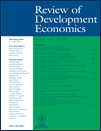
Review of Development Economics
Empowering policy through rigorous economic research.The Review of Development Economics, published by WILEY, stands as a significant scholarly journal dedicated to the field of development economics. With an ISSN of 1363-6669 and an E-ISSN of 1467-9361, this journal not only addresses critical economic issues but also explores their geographical and planning aspects, categorizing itself in the Q2 quartile for both Development and Geography, Planning and Development as of 2023. The journal, established in 1997 and continuing to date, emphasizes original research and integrative perspectives that are pivotal for policy-makers, academics, and students. With a Scopus rank of #104 in Development and #286 in Geography, it represents a valuable forum for discussing impactful development strategies amidst global challenges. While currently not offering Open Access, the journal ensures comprehensive coverage of developmental studies and encourages submissions that aim to advance both theoretical frameworks and practical applications, all while fostering a deeper understanding of effective development practices in a rapidly changing world.

Annals of Economics and Finance
Cultivating Scholarly Excellence in Economics and Finance.Annals of Economics and Finance is an esteemed academic journal published by Wuhan University Journals Press, focusing on the fields of Economics and Finance. Established in 2000, this journal serves as a platform for scholars to disseminate their research findings and insights, contributing to the development of these disciplines through rigorous peer-reviewed articles. Despite currently holding a Q4 ranking in both Economics and Econometrics and Finance categories (2023), it strives to enhance its impact on the academic community and policy-making audiences. While not Open Access, the journal seeks to cultivate a deeper understanding of vital economic theories and financial practices, thereby offering invaluable resources for researchers, professionals, and students alike. With its broad scope, the Annals of Economics and Finance is poised to play a crucial role in shaping contemporary economic discourse up to 2024 and beyond.